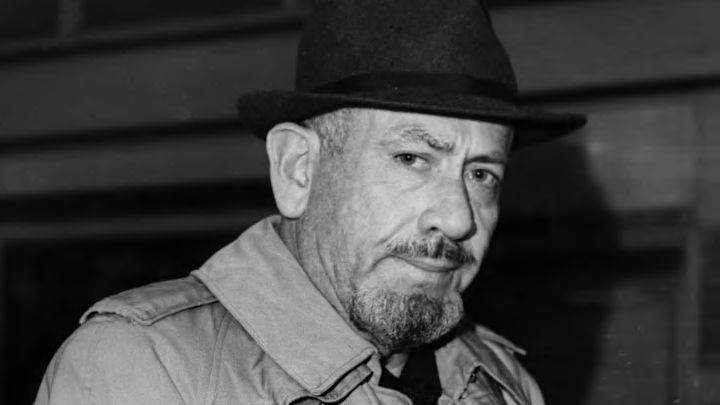The Federal Bureau of Investigation's once-classified documents on some of America’s greatest writers seemed to blur the lines of free speech, creativity, and apparent subversive behavior. Here are some tidbits from the files on 10 literary giants.
1. Ernest Hemingway

According to many of Ernest Hemingway's friends, it wasn’t money or terminal cancer that drove the Nobel Prize winner to take his own life in 1961. Many of them say that it was the FBI that made him paranoid. Hemingway was admitted to the Mayo Clinic in Minnesota in 1960 for growing mental and physical illness. He died that summer.
“The Clinic had suggested that Mr. Hemingway register under the alias George Sevier,” a January 13, 1961 letter to FBI Director J. Edgar Hoover said. “Mr. Hemingway is now worried about his registering under an assumed name, and is concerned about an FBI investigation.”
2. John Steinbeck
John Steinbeck didn’t have time for Hoover’s spy games. “Do you suppose you could ask Edgar’s boys to stop stepping on my heels?," he wrote to U.S. Attorney General Francis Biddle in 1942, "They think I am an enemy alien. It is getting tiresome.”
Hoover quickly learned about The Grapes of Wrath author's request, and wrote back, “I wish to advise that Steinbeck is not being and has never been investigated by this Bureau.” Needless to say, FBI agents continued investigating Steinbeck, even tracking his finances through 1964.
3. W.E.B. Du Bois

In October 1950, the FBI received a letter from an unnamed citizen about author W.E.B. Du Bois, which stated: “I’m a strong believer in free speech, but the enclosed clippings from The New York Times reports a speech that seems to me to be subversive to a degree that makes my blood boil."
What, exactly, did this individual object to? “Of all nations today,” the then-80-year-old Du Bois said in a speech in Harlem, New York, “the United States alone wants war, forces other nations to fight, and asks you and me to impoverish ourselves, give up health and schools, sacrifice our sons to a Jim-Crow army, and commit suicide for a world war that nobody wants but the rich Americans who profit by it?" If you want to get on the FBI's radar, that's how you do it.
4. William T. Vollman
In 2013, American novelist, essayist, and war correspondent William T. Vollman wrote about the experience of discovering the hundreds of pages of his FBI file. In them, he was listed as a Unabomber suspect: “S-2047 William T. Vollman. Predicated on a referral from a citizen. Investigation has determined that Vollman, a professional author, is widely travelled, however, existing travel records for him do not eliminate him as a viable suspect.”
5. James Baldwin

For 16 years, federal agents dug into James Baldwin's activities—everything from his sexual and political affairs to his literary writings. The Notes of a Native Son author's file amounts to hundreds of pages of notes and analysis, including newspaper clippings that illustrate the growing racial tension of the '60s and highlight the author's critical opinion of the FBI.
6. Langston Hughes
Not only was Langston Hughes flagged as a Communist, but the FBI also painted him as the anti-Christ. Hughes’s poem, “Goodbye Christ,” caught the Bureau’s attention in 1941. Although written in 1932, it was relatively obscure until it appeared in the Saturday Evening Post on December 21, 1940, and read:
"Listen, Christ
You did alright in your day, I reckon-
But that day’s gone now,
They ghosted you up a swell story, too,
Called it Bible-
But it’s dead now."
It didn’t take long before Hoover started receiving letters about the Harlem Renaissance poet's alleged subversiveness.
7. Truman Capote

The FBI went after Truman Capote because of his alleged ties to the Cuban Revolution. They scrutinized his association with The Fair Play for Cuba Committee, a support group for the Cuban Revolution against U.S. government attacks (which would become famous for its association with Lee Harvey Oswald). But the author claims the government started tracking him because he spread rumors about Hoover’s supposed homosexual relationship. “It got Hoover upset, that much I know,” Capote said. “And it got me … about 200 pages in an FBI file.”
8. Ray Bradbury
Ray Bradbury supposedly had plans to travel to Cuba, which was illegal in 1968. So the FBI tracked him down. Their investigation didn’t last long, however, because agents soon learned that the Fahrenheit 451 author didn't actually have intentions of visiting the country. “Informants and sources, who are familiar with Cuban activities, were unable to furnish any information which would indicate travel to Cuba,” the report said.
9. Dorothy Parker

American poet and renowned wit Dorothy Parker received harsh treatment from the FBI. In the 1930s, according to The New York Times, an “'anonymous outside source’ advised that she had contributed to the ‘Communist movement.’” For the next 25 years, government surveillance kept tabs on her address changes and activities, including when she assisted in founding the Hollywood Anti-Nazi League in 1936. The FBI suspected the group of being a Communist front.
10. Lorraine Hansberry
Lorraine Hansberry's critically acclaimed play A Raisin in the Sun caught Hoover’s eye, spurring lengthy surveillance into her work. “This play contains no comments of any nature about Communism as such,” a ghostreader wrote in a review, “but deals essentially with negro [sic] aspirations, the problems inherent in their efforts to advance themselves, and varied attempts at arriving at solutions.”
This article was originally published in 2015; it has been updated for 2022.
